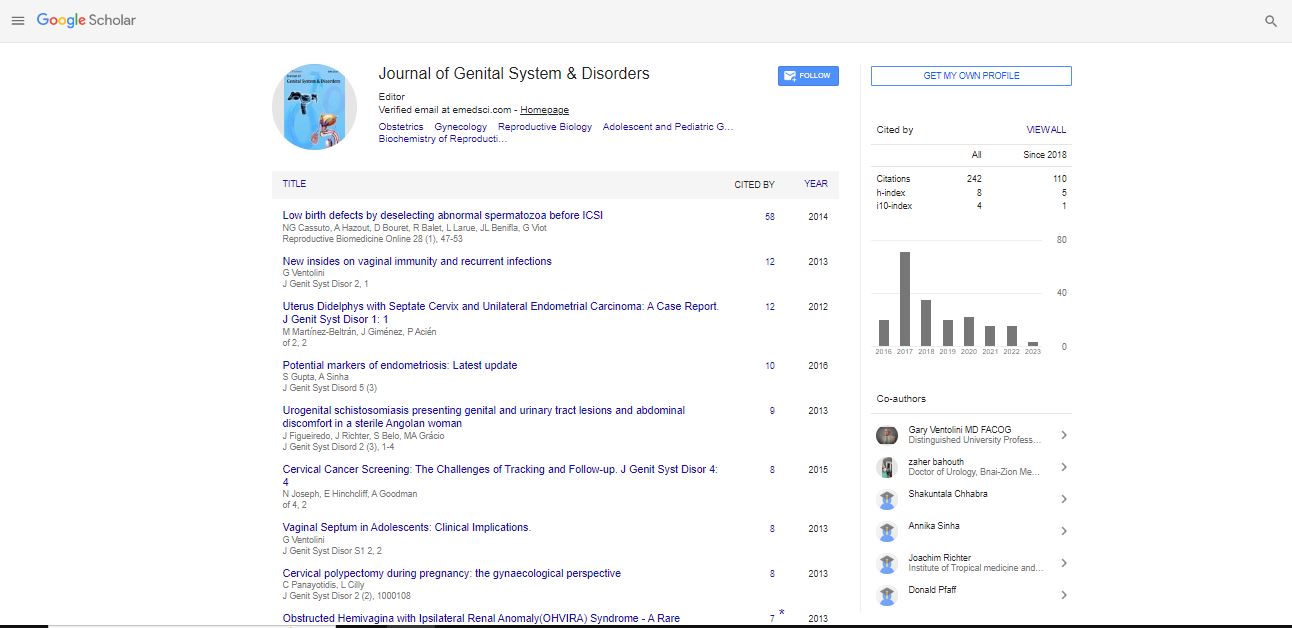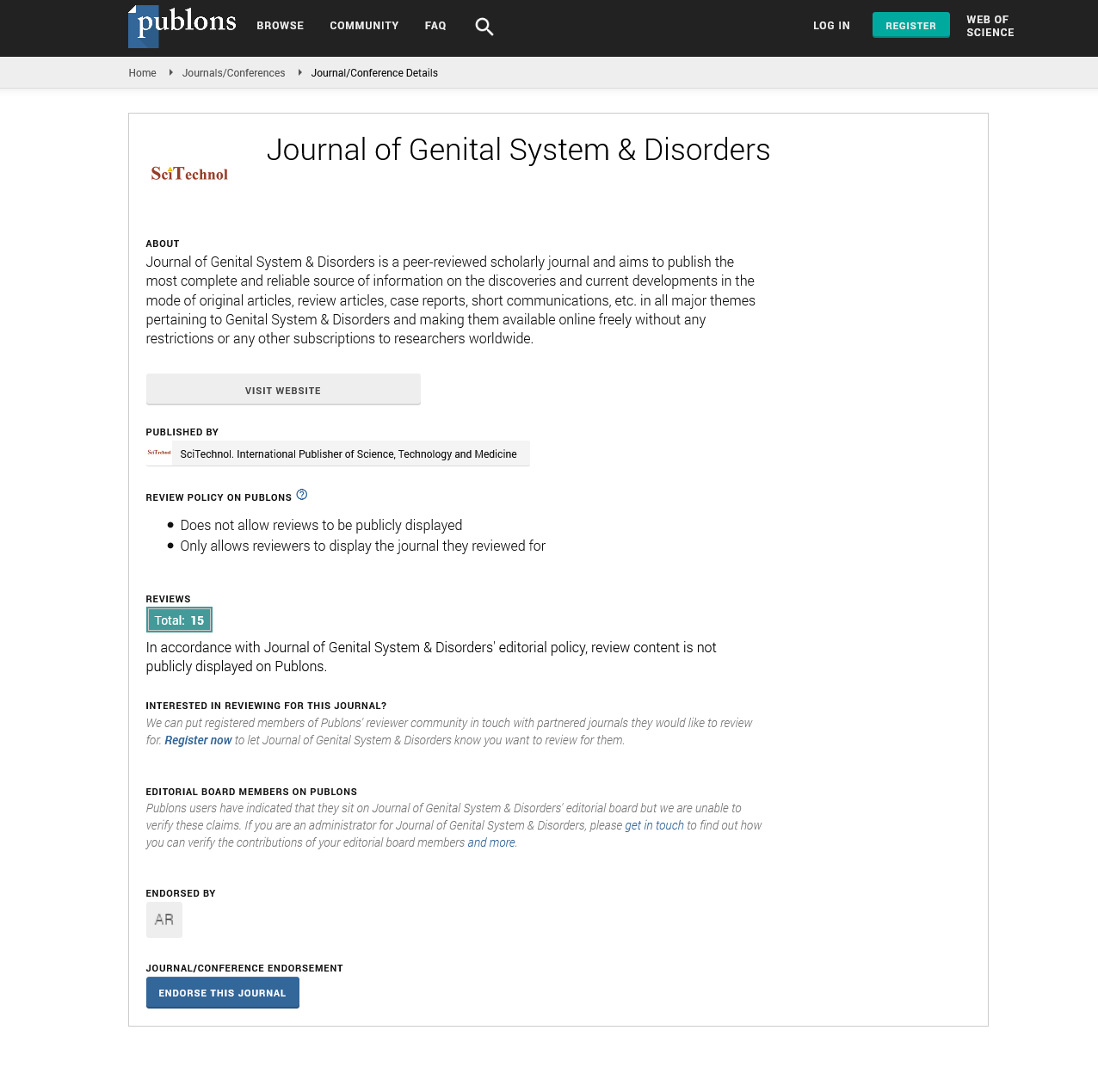Commentary, J Genit Syst Disord Vol: 12 Issue: 2
Reproductive Immunology: Complex Interplay between the Immune System and Reproduction
Laura Fazzi*
1Department of Clinical and Experimental Sciences, University of Brescia, Brescia, Italy
*Corresponding Author: Laura Fazzi,
Department of Clinical and Experimental
Sciences, University of Brescia, Brescia, Italy
E-mail: laura.tincani@unibs.it
Received date: 22 May, 2023, Manuscript No. JGSD-23-107296;
Editor assigned date: 24 May, 2023, PreQC No. JGSD-23-107296(PQ);
Reviewed date: 08 June, 2023, QC No. JGSD-23-107296;
Revised date: 16 June, 2023, Manuscript No. JGSD-23-107296 R);
Published date: 26 June, 2023 DOI: 10.4172/2325-9728.1000277.
Citation: Fazzi L (2023) Reproductive Immunology: Complex Interplay between the Immune System and Reproduction. J Genit Syst Disord 2023, 12:2.
Description
Reproductive immunology is a specialized field that explores the intricate relationship between the immune system and reproductive processes. Reproductive immunology focuses on the complex interplay between the immune system and the processes of reproduction, including implantation, placentation, and fetal development. The immune system plays a dual role in reproductive biology, providing protection against pathogens while ensuring tolerance to the semiallogeneic foetus.
Immune tolerance and reproduction
Successful reproduction requires immune tolerance, which allows the maternal immune system to accept the developing fetus, despite the presence of paternal antigens. The maternal-fetal interface is a unique microenvironment where immune cells, including regulatory T cells (Tregs) and uterine Natural Killer (uNK) cells, play crucial roles in maintaining tolerance and supporting implantation and placentation. Tregs suppress maternal immune responses, preventing rejection of the fetus, while uNK cells promote angiogenesis and trophoblast invasion.
Implantation and immunological interactions
Implantation is a critical step in reproduction that involves complex interactions between the developing embryo and the maternal endometrium. The immune system, particularly the local uterine immune cells, influences this process. Embryo-derived signals and cytokines modulate the immune environment, preparing the endometrium for embryo attachment. The synchronized dialogue between immune cells, such as macrophages and dendritic cells, and the embryo is vital for successful implantation and early pregnancy establishment.
Reproductive immunology and infertility
Immunological factors can contribute to infertility in both males and females. In women, immune dysregulation can lead to recurrent pregnancy loss, implantation failure, or disorders such as endometriosis and unexplained infertility. In men, immune factors can impact sperm function, leading to reduced sperm quality and impaired fertility. Autoimmune disorders, such as antiphospholipid syndrome and systemic lupus erythematosus, can also affect reproductive outcomes. Diagnostic tools, including immune profiling and specialized tests, help identify immune-related infertility causes, guiding personalized treatment approaches.
Immune challenges during pregnancy
During pregnancy, the maternal immune system must adapt to tolerate the fetal semi-allograft while providing protection against infections. Imbalance in immune tolerance mechanisms can lead to complications such as preeclampsia, gestational diabetes, preterm birth, and fetal growth restriction. Dysregulated inflammatory responses, altered cytokine profiles, and immune cell dysfunction contribute to these disorders. Understanding the immunological factors involved in pregnancy complications is essential for early identification, risk assessment, and intervention strategies.
Interventions and future perspectives
Advancements in reproductive immunology have opened avenues for therapeutic interventions. Immune-based treatments, including immunomodulatory agents, Intravenous Immunoglobulins (IVIG), and progesterone supplementation, have shown promise in improving fertility outcomes and managing immune-related pregnancy complications. Furthermore, ongoing research focuses on developing personalized immunotherapies, such as cytokine-based immunomodulation and immune cell-based therapies, to target specific immune dysfunctions.
Conclusion
Reproductive immunology plays a pivotal role in establishing and maintaining successful pregnancies. The delicate balance between immune tolerance and protection is critical for reproductive health. Understanding the immune mechanisms involved in reproduction, as well as the impact of immune dysregulation on fertility and pregnancy outcomes, enables the development of targeted interventions and personalized treatments. Further research and advancements in reproductive immunology will contribute to improved fertility management and enhanced reproductive healthcare for individuals and couples worldwide.
 Spanish
Spanish  Chinese
Chinese  Russian
Russian  German
German  French
French  Japanese
Japanese  Portuguese
Portuguese  Hindi
Hindi 
